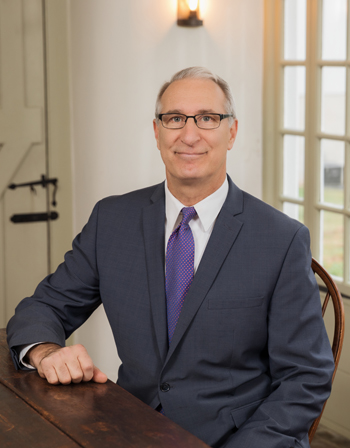 Dean Andrew Hoffman
Dean Andrew Hoffman
The year 2020 will go on record as one of the most vexing and challenging years in modern history. The United States has faced exigent crises — the impact of COVID-19 on our health and economy; a national reckoning on racial injustice; and a polarizing political climate.
As the world deals with so much uncertainty, Penn Vet’s mission has never been more important: to train the next generation of veterinary leaders to advance health care outcomes and access, ensure global health, bolster sustainable agriculture, and create and support interdisciplinary career pathways that drive social impact.
And I write to you in late October to say the School’s pillars — education, research, and clinical care — are strong, and our community remains devoted, engaged, and connected.
COVID-19: Stress tested, we came through… but it wasn’t easy
COVID-19 has stress tested the School, pushing us in the areas of public health, financial management, clinical and diagnostic service delivery, innovation and research, mental health, and leadership.
Always, our priority has been safety, mission continuity, financial stability, and an eventual return to regular research activities, academic programs, and clinical care caseloads. In many respects, we’ve exceeded our expectations.
And with grit and grace, our community has persevered. We’ve countered the pandemic with science-driven public health measures and targeted cost containment — we furloughed no one.
It hasn’t been easy. We’ve wrestled with overcoming mask and other PPE shortages, adopting numerous new hygiene protocols, managing numerous communications from our home bases, shifting education and clinical care delivery, performing virus testing and contact tracing — we were the first vet school to develop and implement such processes — coordinating our activities with local public health officials; and stepping up community support and mental health resources to help with people’s fear and anxiety.
As our faculty and staff worked at home, we’ve strived to balance workloads and schedules and provide resources, such as childcare grants, for employees who are dealing with family demands.
Through it all, we have maintained zero coronavirus transmission at work. This incredible feat was made possible by our community’s strict adherence to protocols, and a deep appreciation that everything each of us does matters to everyone else.
Bellwether chronicles many of these history-making activities, from our pandemic response across three pillars to how we’re safeguarding Pennsylvania’s agriculture and food supply chain. And the issue spotlights research on understanding SARS-CoV-2, as well as a Penn Vet alumnus who is hunting viruses to prevent new pandemics.
SOCIAL JUSTICE: We’re learning from 2020 how to build an equitable future
The magazine also outlines critical steps Penn Vet and the University of Pennsylvania are taking to address systemic racism.
The veterinary profession is far from diverse and inclusive. Equity is long overdue. However, there is a promising trend: significantly more students from underrepresented minorities are applying to veterinary school. This is a remarkable moment, reminding us of the gender shift that occurred in veterinary medicine when it transformed from a male-centered profession to one where women are now the majority.
Penn Vet will do everything in our power to foster an enduring culture of diversity, equity, and inclusivity for the School and our profession. As to our nation — it is my greatest hope that we are poised for true change and will rise from the pain of systemic racism a better and more just country.
ONE HEALTH: Good leadership is learning
We have learned that the COVID-19 pandemic is a One Health nightmare of virus spillover from bats to humans that must not be repeated. From this, we know for certain that veterinarians should be more engaged across human and environmental health. And it starts with creating new education and career opportunities.
You’ll read more about how Penn Vet is shaping new careers for veterinarians by offering new interdisciplinary degree and certificate programs, some of which launched in September.
The breadth of these degree options is made possible by the geographic proximity of 12 Penn schools and a fervent University-wide commitment to interdisciplinarity. I could not be more excited.
2020: Invincible humanity brought forward
This publication covers a very strange year. What it could never adequately capture, however, is the humanity behind every event and choice the School has made since March 2020.
Penn Vet leadership, as well as key staff representing diverse areas of the School, have spent countless hours considering how best to meet the uncharted needs of 2020. In some cases, we were able to do so without tremendous interruption, in others we made heartbreaking decisions to stop work as usual. In all cases, I have witnessed profound creativity, collegiality, emotional and social intelligence, compassion, and commitment. As I tell everyone, we have a great leadership team!
But our talent extends beyond leadership. I am proud to support an amazing community of faculty, frontline and behind-the-scenes staff, students, clients, donors, and alumni who have responded nobly to the COVID-19 crisis. During a year of relentless change, we have grown stronger, closer, and more committed to Penn Vet’s enduring legacy.
I am deeply grateful for each of you — you have proven once again that Penn Vet is the best veterinary school in the world.
Andrew M. Hoffman, DVM, DVSc, DACVIM
The Gilbert S. Kahn Dean of Veterinary Medicine